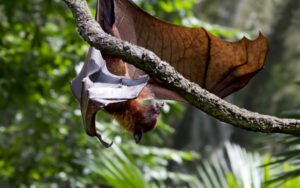Barber is among the increasing amount of sensory biologists who believe that humans are inflicting harm on the earth with too much light, which is destroying the lives to other animals. Even in the center of the national park lights from technology that humans have created intrude on the darkness. It erupts through the heads of cars passing by and from the fluorescent lamps at the visitor center as well as from lampposts surrounding the cars that are parked. “The parking lot is lit up like a Walmart because no one thought about the implic Tropical Birds ations for wildlife,” Barber declares.
Many flying insects are attracted by streetlights
, mistakenly thinking the lights for celestial and then soaring over them until they fall to exhaustion. Bats are among the species that profit from their confusion and feast on disorientated crowds. Some species that are slow-moving
like the small brown bats Barber identified, stay out of the lights, perhaps because it makes them more to eat for Owls. The light can alter the animal community by attracting some species in and removing others, with consequences that are difficult to predict.
To test the effects of light on bats at Grand
Teton, Barber persuaded the National Park Service to let him test an unorthodox method. In the year 2019, he replaced all 32 streetlights of Colter Bay. Colter Bay parking lot with special bulbs that change the color. They produce white light, which firmly influences insect behavior as well as bats or red light which isn’t apparent to affect the behavior of bats and insects. Every couple of days during my stay Barber’s team changes their colors.
The funnel-shaped traps that hang below the lamps catch the insects in the area, and radio transponders receive signals of the bats that are tagged. The data will reveal how white light sources affect the wildlife in the vicinity and whether red lights could help to re-wild the sky at night.
Cole provides me with a short
demonstration of turning the lights from red to green. The parking lot seems utterly terrifying like we’ve been transported to a horror flick. As my eyes adjust to the bright red, the colors appear less dramatic and more comfortable. It’s amazing the amount we still be able to see. The cars, as well as the surrounding foliage are visible.
I look up and observe that less insects appear to be hiding under the lamps. I turn my head and see the line from the Milky Way cutting across the sky. It’s an incredible view, and one that I’ve not seen prior to within my lifetime in the Northern Hemisphere.
Each animal has its own sensory bubble
only seeing a small sliver of the vast world. There’s a fantastic term to describe this sensory bubble:it’s called the word “Urban”. It was first coined and popularized by Baltic German zoologist Jakob von Uexkull in 1909. Environmental is derived from the German word that means “environment,” but Uexkull did not apply it to an animal’s environment. It’s more specifically the area of environment that an animal is able to feel and perceive as its world. 
A tick, searching for mammalian blood, is concerned about body heat, the feel of hair, and the smell of butyric acid emanating from its skin. It doesn’t pay attention to other triggers and likely isn’t aware of their existence. Every environment is limited but it does not feel like it. Every one of them is a complete experience for the people who are exposed to it. Our environment is all we have, and we often mistake it for all we be aware of. This is a false impression that each creature has. More
Humans do have the ability to comprehend the environmental
worlds of other species. And over the course of centuries, we have learned a lot about these sensory realms. However, in the time that it took us to gather this knowledge, we have transformed the world in a radical way. A lot of the destruction that has been caused by us is the way we live. The climate has changed and sulfated the oceans. We have moved species over continents and replaced native species with invaders.
We’ve triggered what scientists call an age one of “biological annihilation,” comparable to the five mass extinctions of the prehistoric period. However, we’ve also created a sonic environment and darkness with light. This often ignored phenomenon is called sensory pollution–human-made stimuli that interfere with the senses of other species.
Through provoking creatures
with stimuli of our personal creation, we have made them live in our environment. We’ve diverted them from the things they require to perceive and have obliterated the signals they rely on and enticed them into traps of sensory stimulation. This is all capable of causing irreparable damage. The researchers estimated
that two-thirds of the populationof the world lived in areas with light pollution, where nights were at a minimum 10 percent brighter than the natural darkness. The majority of the population lives by the equivalent of constant moonlight. Another 25 percent of them are continuously soaked in artificial twilight that is greater than the light of the full moon.
“‘Night’ never really comes for them,”
the researchers said in their paper. The year was 2016, and when the group revised the atlas they discovered that the issue was more severe. Bird Flying At the time, around 83 % of the population, including over 90% of Americans and Europeans – were living under light-polluted skies.
Nearly a third of humanity, and more than eighty percent of North Americans, can no longer be able to see the Milky Way. “The thought of light traveling billions of years from distant galaxies only to be washed out in the last billionth of a second by the glow from the nearest strip mall depresses me to no end,” the scientist who studies visual ecology, Sonke Johnsen, once wrote..
